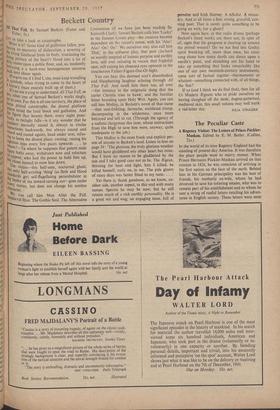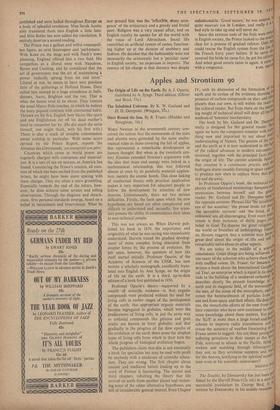The Peculiar Caste
IN the world of its time Regency England had the standing of present-day America. It was therefore the place people went to marry money. When Prince Hermann Ptickler-Muskau arrived on that mission in 1826, he was conscious of arriving in the first nation on the face of the earth. Behind him in his German principality was his best of friends, his motherly ex-wife, whom he had divorced to save his tottering estates, who was to remain part of his establishment and to whom he sent a string of rueful letters retailing his adven- tures in English society. These letters were soon published and were hailed throughout Europe as a body of splendid revelation. Miss Sarah Austin ably translated them into English a little later and Miss Butler has now edited the translation. It entirely deserves a second reading.
The Prince was a gallant and wilful cosmopoli- tan figure, an avid theatregoer and 'parkomane.' With Kean on the stage and with Nash's town planning, England offered him a rare field. His sympathies as a liberal were with Napoleon, Byron and Canning, and he considered that the art of government was the art of maintaining a power 'radically sprung from sin and error.' Liberal or not, he seems to have seen precious little of the gatherings at Holland House. Duty called him instead to a huge attendance at balls, dinners, Ascot, Brighton and the rest. That is what the letters tend to be about. They contain the usual Marco Polo touches, in which he notices the more piquant contrasts with continental habit. Thrown on the fire, English beer blazes like spirit and one Englishman cut off his dead mother's head to remember her by. (He did much the same himself, one might think, with his first wife.) There is also a stock of amiable conversation about nothing in particular. With some sauce devised by the Prince Regent, reports 'the Almanac des Gourmands, 'on mangerait son pere.'
Countries which come to world power are regularly charged with coarseness and material- ism. It is a sort of tax on success, as America has found. Considering the Prince's mission, all men- tion of which has been excised from the published letters, he might have been more sparing with these charges. They are often a mere grumbling. Especially towards the end of the letters, how- ever, he does achieve some serious and telling observations. Through the elegance and detach- ment, firm personal standards emerge, based on a belief in naturalness and benevolence. What he
saw around him was the 'inflexible, stony arro- gance' of the aristocracy and a greedy and brutal poor. Religion was a very casual affair, and on English royalty he speaks for all the world with the voice of Lord Altrincham. Social life resembled an artificial system of castes, function- ing higher up at the dictates of snobbery and fashion. He decided that the fashionable were not necessarily the aristocratic but a 'peculiar caste' in English society, 'an imperium in imperio.' The essence of his charge is that decency was deeply unfashionable. 'Good nature,' he was assured, '1, quite mauvais ton in London; and really it Is $ bad style to take up and will never do.' Since the extreme ends of the fruit were rotten' in English society, the Prince looked to the nude!‘ class for a process of gradual reform. Only lb.,11 could rescue the English system from the fate .0 the French forty years before. If he never di's. covered the bride he came for, he got his refornis. And when good nature came in again, it came l$































 Previous page
Previous page